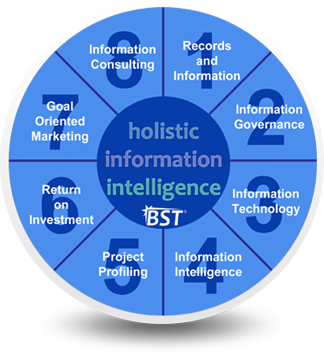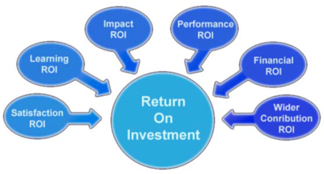
Return on Investment (ROI) is a measure that is used to evaluate the efficiency of an investment in an information project. To calculate ROI, the benefit (return) of an investment is divided by the cost of the investment; the result is expressed as a percentage or a ratio.
The return on investment formula:
Click to enlarge
In the above formula "gains from investment", refers to the proceeds obtained from the investment of interest. Return on investment is a popular metric because of its versatility and simplicity. If an IGT investment does not have a positive ROI, then the investment should be reconsidered. Example, if the use of a paper over e-documents system is more efficient, the deployment of an Electronic Document Management System (EDMS) would undermine the "paper" efficiency and vice versa.
The calculation for return on investment can be modified to suit a number of situations - it depends on what organizations include as returns and costs. The definition of the term attempts to measure the profitability of an investment and there is no one "right" calculation. For example, an organization may compare two different solutions to address a specific business need. The organization's financial analyst, may compare the same two products using an ROI calculation to assist in determining which solution has the highest ROI. ROI calculations can be easily manipulated to suit the organization's purposes, the result can be expressed in many different ways.
At one time, ROI used to be a term of concern only to accountants. Now organizations can use ROI to prove the value of a variety of activities.
The following are common types of ROI that organizations can use to prove value in their investment:
Click to enlarge
-
Satisfaction Return on Investment: This type of ROI is the simplest for organizations and is used with a simple satisfaction checking dialogue or questionnaire. This can be "if you were to rate your satisfaction with the deployed information solution what score would you give it?
-
Learning Return on Investment: This type of ROI uses questions to check what new knowledge and skills have been learned as a result of coaching or mentoring in the organization.
-
Impact Return on Investment: This type of ROI is to enquire about how learned skills and knowledge have been deployed in behaviors and attitudes in the organization. What have staff done differently as a result of the training? This is usually assessed by gathering evidence from verbal or written, or opinions from staff members themselves.
-
Performance Return on Investment: This type of ROI aims to identify how the knowledge, skills and behaviors have been applied to improve performance in the staff member's job function performance. Quantitative evidence is normally sought to identify how much more or less of a thing has been successfully done. This is the beginning of being able to show where value has been added.
-
Financial Return on Investment: This type of ROI is used to produce a monetized calculation. This is the first really credible information you can offer the organization of the worth or value added.
-
Wider Contribution Return on Investment: This type of ROI measures the value of the contribution of the first five types of ROI to the wider personal and/or organizational situation.


